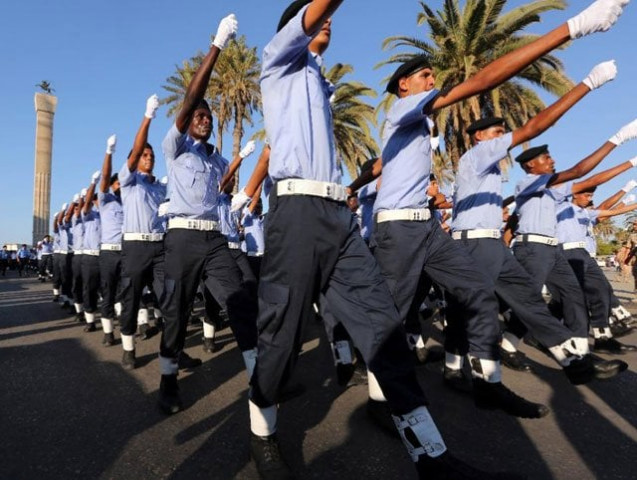At least 50 dead in Libya police school suicide truck bombing
A suicide bomber detonated an explosives-laden truck used for carrying water at a police school

A suicide truck bombing on a police training centre in Libya's western city of Zliten killed at least 50 people Thursday, in one of the deadliest attacks yet to hit the strife-torn country.
A suicide bomber detonated an explosives-laden truck used for carrying water at a police school in central Zliten, a coastal city about 170 kilometres (100 miles) east of the capital Tripoli, a local security source told AFP.
A witness in Zliten told AFP some 300 men, mainly coast guards, were inside the training compound at the time of the blast.
Health ministry spokesman Ammar Mohammed Ammar said 50 to 55 people had been killed and at least 100 wounded and that victims were being treated in several hospitals. Urgent calls were issued for blood donations.
There was no immediate claim of responsibility for the attack but the Islamic State militant group, which has been growing in power in Libya, has previously carried out many suicide bombings in the country.
A spokesman for the Zliten hospital, Moamer Kadi, told AFP it had received at least 40 bodies and was treating 70 wounded.
"We don't have a clear idea of the total toll, other victims were taken to hospitals in Misrata and Tripoli," he said.
The hospital in Misrata, about 55 kilometres (35 miles) east of Zliten, said it had received at least four bodies and was treating some 50 wounded.
The UN envoy to Libya, Martin Kobler, denounced the attack and called for national unity.
"I condemn in the strongest terms today's deadly suicide attack in Zliten, call on all Libyans to urgently unite in fight against terrorism," he wrote on Twitter.
IS could expand from Libya but faces hostile environment: experts
Libya has been beset by chaos since the 2011 overthrow of longtime dictator Moamer Kadhafi and IS has been gaining influence.
The country has had rival administrations since August 2014, when a militia alliance overran Tripoli, forcing the government to take refuge in the east.
Calls for unity
The United Nations is pressing the rival sides to accept a power-sharing deal.
On December 17, under UN guidance, lawmakers from both sides and a number of independent political figures signed a deal for a unity government, but the agreement has yet to be implemented.
It has so far failed to win unanimous backing from Libya's two rival parliaments, one based in the eastern city of Tobruk and the other in Tripoli.
In a statement after Thursday's attack, EU foreign policy chief Federica Mogherini urged Libyans to back the agreement.
"Once again the Libyans are mourning victims of an attack," she said. "The people of Libya deserve peace and security and... they have a great opportunity to set aside their divisions and work together, united, against the terrorist threat facing their country."
World powers fear Libya could descend further into chaos and become a stronghold of IS on Europe's doorstep.
The group claimed a string of atrocities in Libya last year, including the January attack on a luxury hotel in Tripoli known for hosting foreign diplomats and Libyan officials, which killed nine people.
A month later it released a video showing the beheading of 21 Coptic Christians, all but one of them Egyptians, that the militants said they captured in Libya in January.
In a report to the UN Security Council in November, International Criminal Court chief prosecutor Fatou Bensouda said that IS had been responsible for at least 27 car and suicide bombings in Libya in 2015.
IS has in recent days launched a series of attacks on oil facilities in eastern Libya, pushing east from the group's coastal stronghold of Sirte.
US strike kills head of Islamic State in Libya: Pentagon
Officials have warned of crippling consequences for the country if the militants manage to seize control of Libya's oil resources.
Oil is Libya's main natural resource, and the country sits on reserves estimated at 48 billion barrels, the largest in Africa.
Calls have been growing for a possible foreign military intervention to bring stability to Libya and contain IS, which is reported to have at least 3,000 fighters in the country.
Militants have also used Libya as a springboard for attacks across the border in Tunisia, including at the capital's National Bardo Museum and a beach resort, killing a total of 60 people, all but one of them foreign tourists.


















COMMENTS
Comments are moderated and generally will be posted if they are on-topic and not abusive.
For more information, please see our Comments FAQ